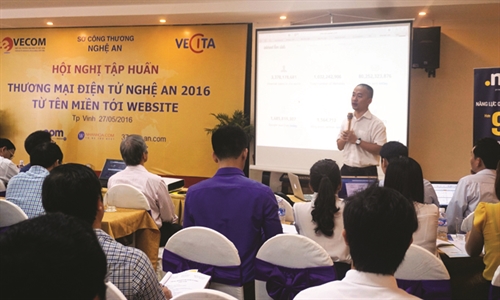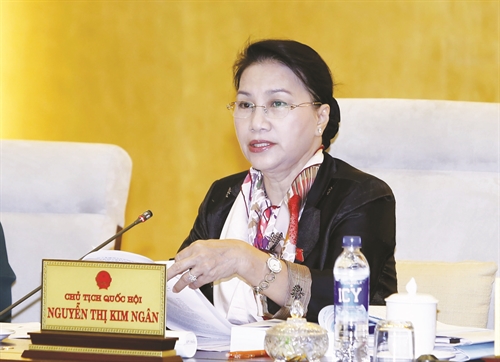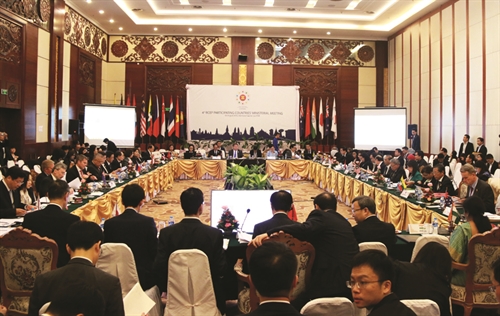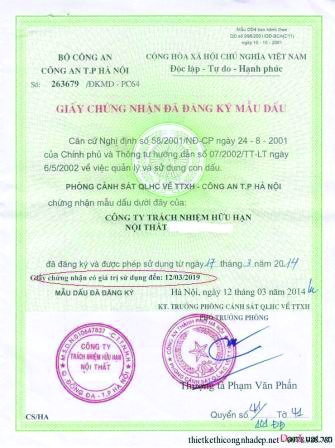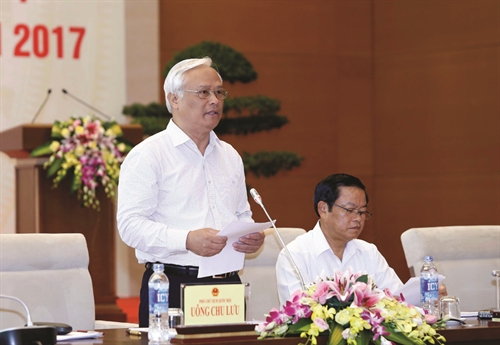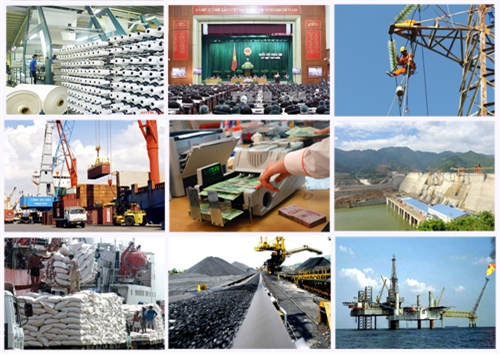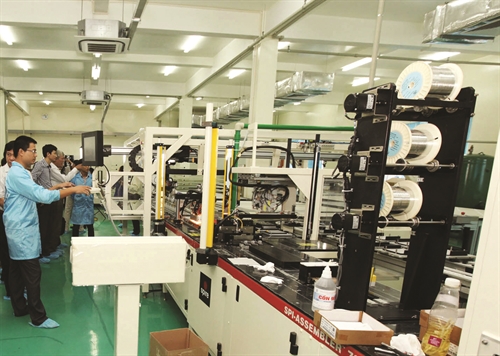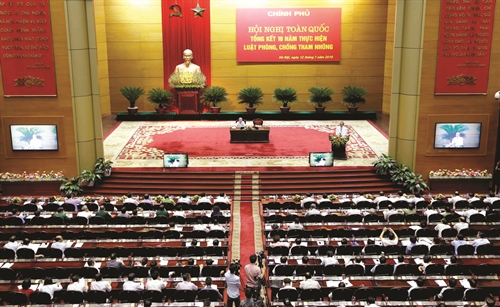The 14th National Assembly (NA) convened its second session in Hanoi on October 20, expecting to dedicate much time of its agenda to lawmaking activities.
Scheduled to last until November 23, the NA’s second session will consider and pass four draft laws concerning associations, belief and religion, property auction, and amendments to the Penal Code, and a draft resolution revising some articles of the Resolution on exemption from and reduction of agricultural land use tax.
Worthy of note, the draft Law amending a number of articles of Penal Code No. 100/2015/QH13 covers revisions to 141 articles, including 18 articles in the Part “General Provisions” and 123 articles in the Part “Crimes”. The revisions will deal with technical errors in 43 articles and content-related errors in other 97 articles. The drafters propose annulling Article 292 on the crime of illegally providing services in the computer and telecommunications networks.
The NA will give opinions on 12 other draft laws for the first time, which are important and have great influence on the society, including those proposed by the Government to be immediately included in the lawmaking program in order to promptly remove difficulties for production and business activities and provide supports for businesses.
These draft laws include those concerning foreign trade management; management and use of weapons, explosives and supporting tools; supports for small- and medium-sized enterprises; irrigation; guard force; and planning. Others include draft revisions to the laws on railways; management and use of state property; technology transfer; state compensation liability; tourism; and legal aid.
According to NA’s Secretary General Nguyen Hanh Phuc, the NA will promote the publicity, transparency and democracy in its activities. Especially, the NA will reserve time and take measures to increase dialogues and arguments among NA deputies themselves and between NA deputies and cabinet members with a view to clarifying relevant issues right at the NA’s forum.
He said the cabinet members may explain right at this session the matters in which the NA deputies are interested. When an NA deputy or a minister is presenting his opinions, those who wish to make arguments may raise a notice board to register for expressing their arguments instead of pressing the button and waiting for their turn as at previous sessions.
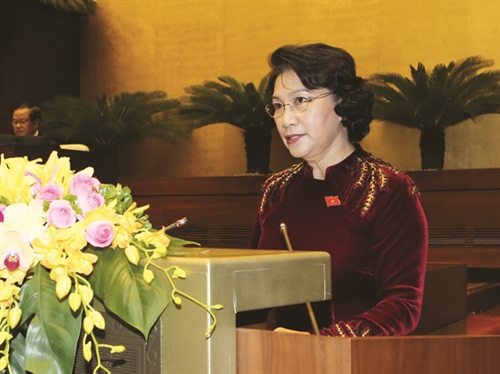 |
| National Assembly Chairwoman Nguyen Thi Kim Ngan addresses the opening ceremony of the second session of the XIVth Legislature __Photo: Trong Duc/VNA |
Presenting the Government’s report on the country’s socio-economic development in 2016 at the opening meeting, Prime Minister Nguyen Xuan Phuc is concerned that Vietnam might fail to achieve its GDP goal of 6.7 percent this year as the average economic growth in the last three quarters reached only 5.97 percent, which was much lower than the GDP growth rate of 6.5 percent in the same period last year. He said the average economic growth is projected to reach only 6.3-6.5 percent this year.
“That economic growth has failed to meet the goal will affect other targets, for example it will lead to higher budget deficit and public debt,” Phuc said.
On October 22, the third working day of the session, the lawmakers approved the Government’s report on implementation of financial and budget tasks over the past five years, acknowledging that the state budget revenue witnessed a faster decline than during the previous period.
The report explains that the revenue from taxes and charges accounted for 20-21 percent of GDP, partly due to the tax exemption policy that aims to remove obstacles for businesses.
Deputy Mai Thi Anh Tuyet from An Giang province proposed the Government to seriously evaluate the tax exemption and reduction policies, saying these policies should be viewed in the perspective of which one has impetus to the economy and which one does not generate revenue for the state budget.
The legislators expressed dissatisfaction with the Government presenting the NA with a fait accompli in the budget settlement, saying that almost all expenditures exceeded and were inconsistent with the development goals that showed a lack of fiscal discipline.
Tuyet asked for stricter handling of such cases, especially the disbursement of each project, to create clarity and discipline. She said the NA’s supervision of the investment in construction works showed waste and other problems. Some official development assistance projects greatly exceeded the cost estimates.
Commenting on the Government’s report on public debt management during 2016-20, the lawmakers said the annual target of public debt not exceeding 65 percent of GDP was appropriate. They agreed with the Government’s financial solutions for the next five years that are restructuring the financial market, ensuring a reasonable structure of the monetary market, capital market and insurance market.
They recommended rapid develop-ment of the capital and insurance markets, saying developing the securities market would be good for Vietnam in mobilizing social resources and foreign capital.
Deputy Prime Minister Vuong Dinh Hue said that raising the debt ceiling, as some legislators suggested, would affect the country’s loan repayment capacity, so the Government has decided to keep the debt ceiling.
“To ensure a safe and stable debt ceiling, we are determined to keep the annual public debt below 65 percent, government debt at 55 percent and foreign debt not exceeding 50 percent,” Hue said.
Meanwhile, the Government’s report on the economic restructuring plan during 2016-20 said the plan has an overall target of restructuring the economy linked to changing the growth model, and is aimed at improving the effectiveness of the distribution and use of development resources, with a more reasonable and dynamic economic structure of higher productivity, higher competitiveness and bigger growth potential, and ensuring sustainable, clean and green growth.
The plan also aims to modernize the planning of economic sectors and economic regions toward increasing productivity, quality and efficiency in connection with promoting international integration; and restructure the markets of important products, including the land use rights market, labor market and science and technology market.
To achieve the targets, the plan puts forth key tasks, such as improving the business environment and supporting the development of the private sector, resolutely equitizing state enterprises and withdrawing state capital under approved plans. Other tasks include completing the public investment mechanism, reorganizing agencies providing public services, accelerating the handling of non-performing loans, and developing and restructuring prioritized economic sectors.
The Government’s report on medium-term public investment plan sets a target of maximizing the attraction of and effectively using investment capital sources to develop the economy and complete basic infrastructure systems for the implementation of the socio-economic development strategies during 2011-20 and during 2016-20.
Public investment will focus on 14 key sectors, including agro-forestry, fishery and irrigation, industrial sector, transport, education and training, information technology, science and technology, natural resources and environment, healthcare, and food safety and hygiene.- (VLLF)
